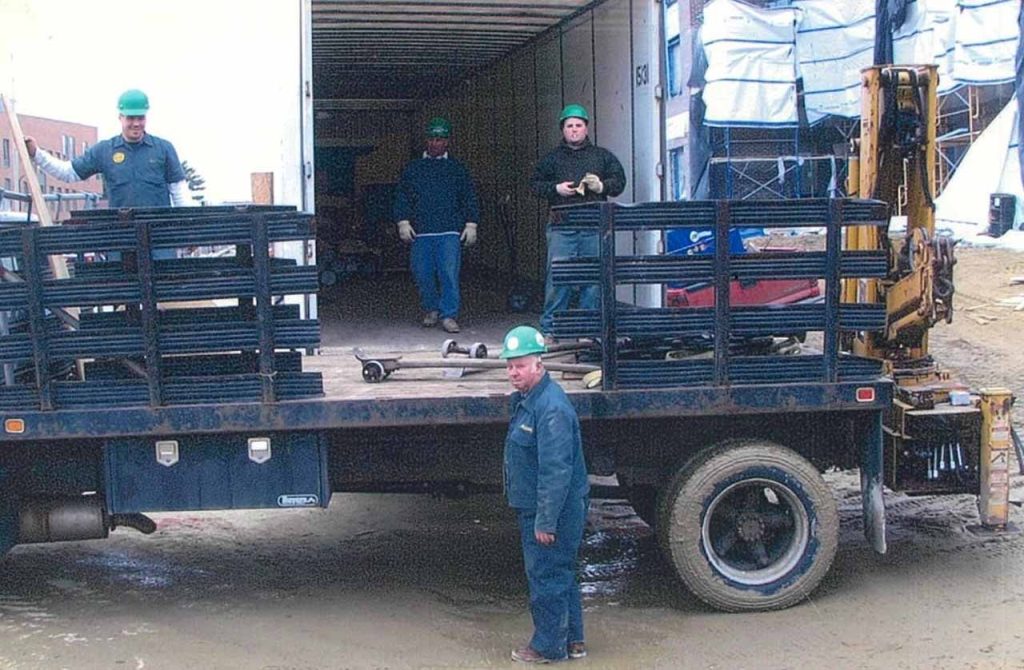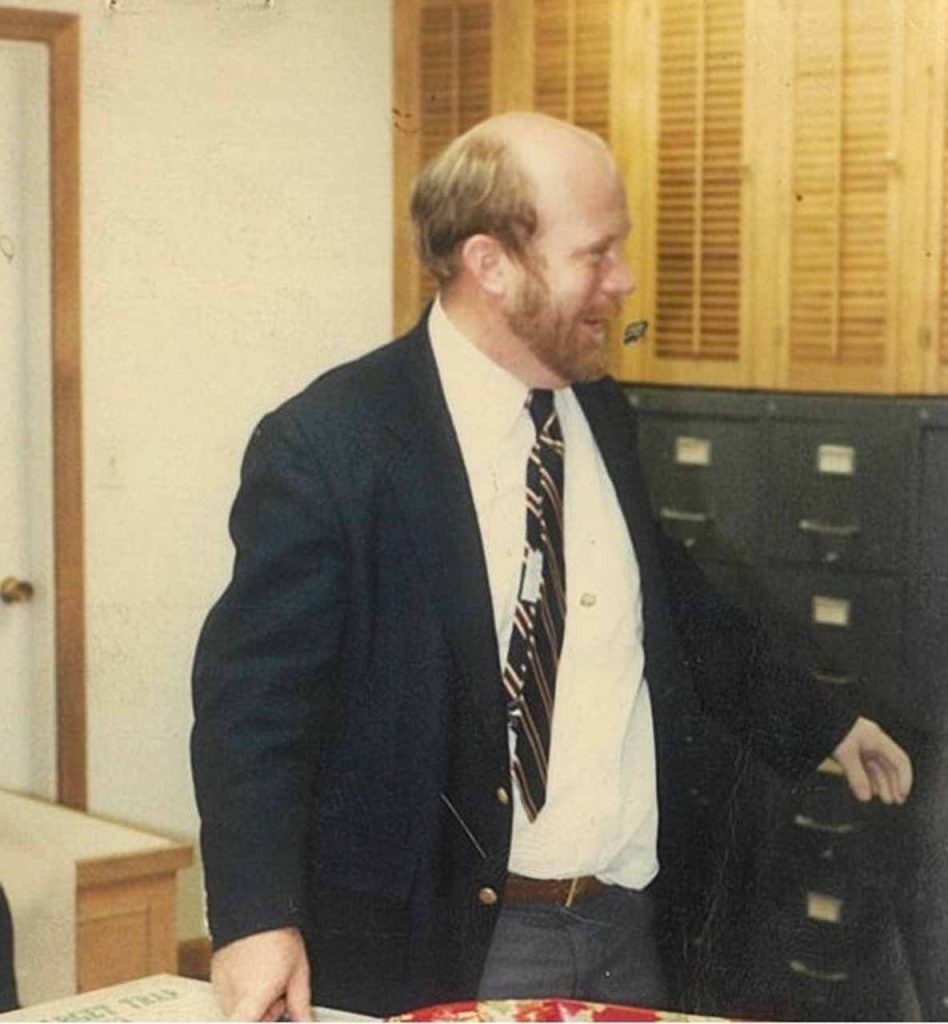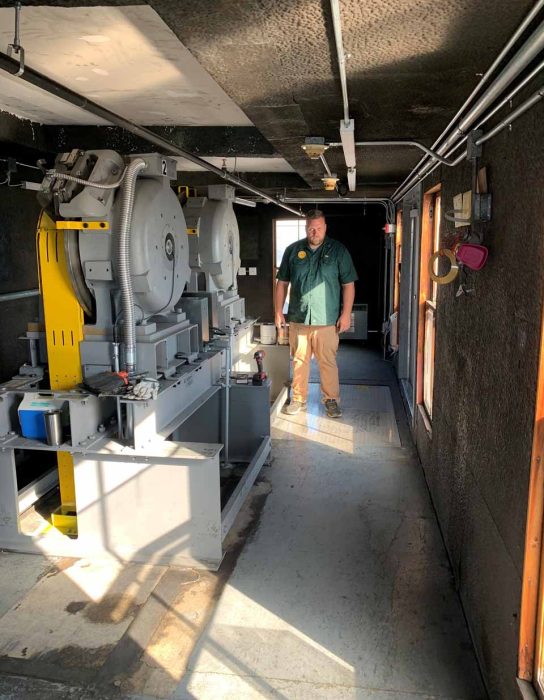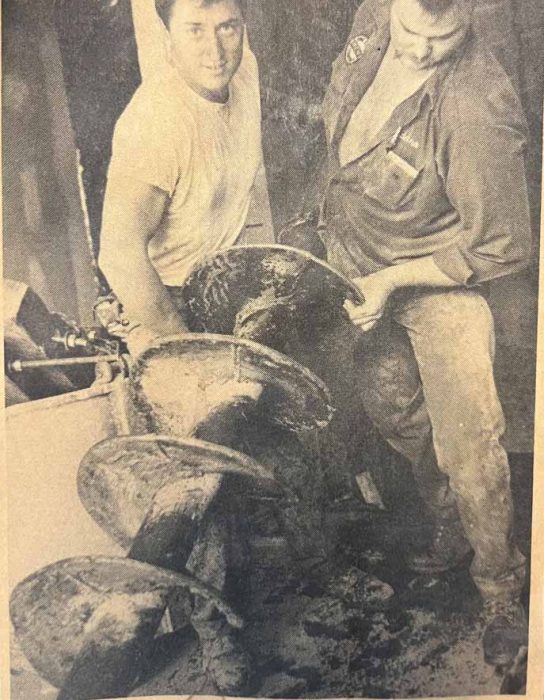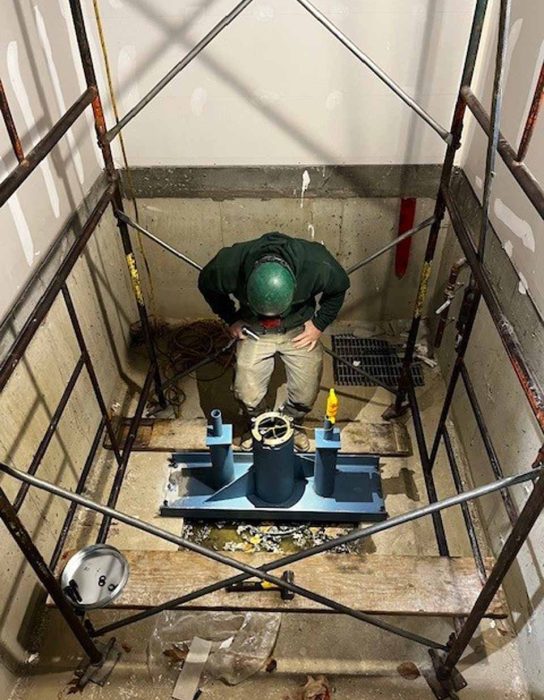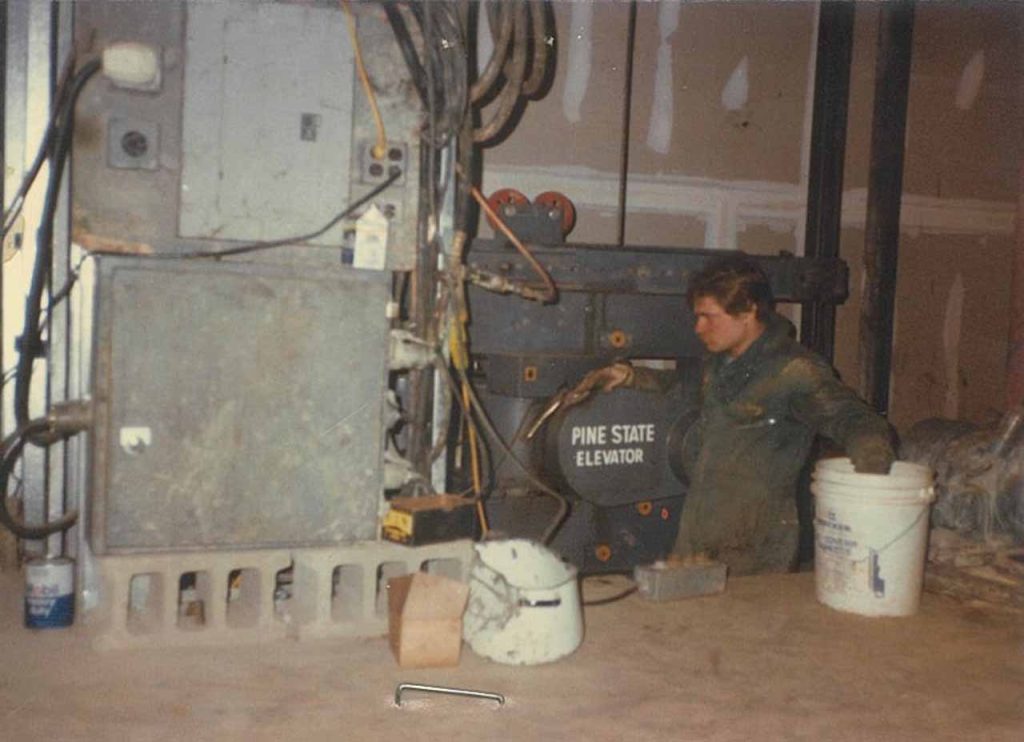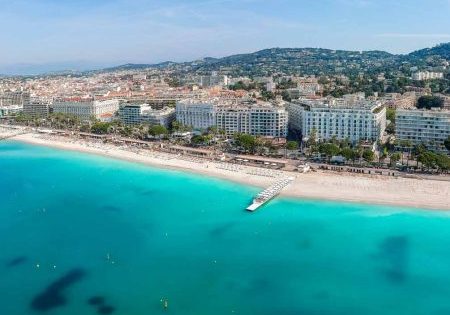Family Ties
May 1, 2025
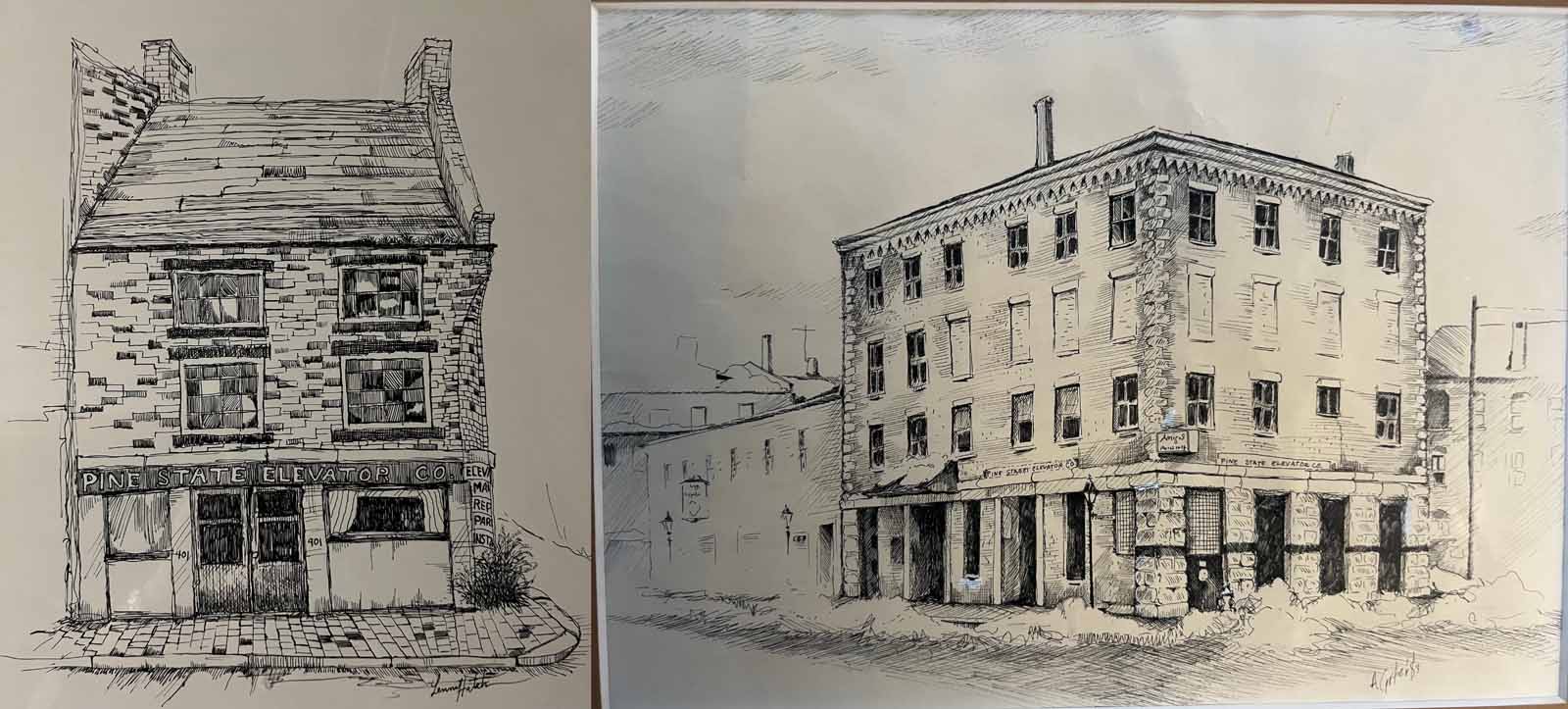
Celebrating 75 years, Maine’s Pine State Elevator Co. adheres to longstanding principles.
photos courtesy of Pine State Elevator
Steve McDuffie, son of Portland, Maine-based Pine State Elevator Co. co-founder Kenneth McDuffie, remembers going on service calls with his dad to the Freeport, Maine, headquarters of iconic retailer L.L. Bean in the mid-1950s. When they heard a tapping on the freight elevator door, they knew it was probably the founder, Leon Leonwood Bean himself, tapping his cane to call an elevator. Celebrating its Diamond Anniversary this year, Pine State Elevator has been maintaining elevators at all L.L. Bean Freeport locations (now numbering five) since, says Pine State Vice President and Service Manager Travis McDuffie, one of Steve’s sons. The retailer is among scores of Pine State’s regular, long-term customers served by a core team of 26 (22 in the field and four in the office). Almost all of Pine State’s customers are longstanding ones, Travis McDuffie says. Another favorite customer, Travis McDuffie says, is R.H. Reny, Inc., a Maine department store chain that’s been in business since 1949.
Travis McDuffie says:
“The stores are still owned by the Reny family, and they have been a customer for more than 30 years. I really admire that Bob Reny (son of company founder R.H. Reny) never asks an employee to do anything he’s not willing to do himself. It seems like whenever I talk to him, he’s on a store roof fixing a leak or wading through a flooded basement, even though he’s supposed to be semi-retired.”
The One They Didn’t Do
Ironically, the most important project for Travis McDuffie, and the company, is “the one we didn’t do.” Sometime around 2011, when the Maine construction industry was still struggling to emerge from the 2008 recession, Pine State was invited to bid for a new, ground-up hospital construction project in central Maine. The project combined two separate regional hospitals into a single, purpose-built campus served by “something like 17 elevators and four materials lifts.” The project had a tight, expedited timeline, with bonuses for trades that could hit deadlines. “It was the biggest project around at the time and certainly would have been the biggest in our history,” Travis McDuffie recalls.
Travis McDuffie was then running the construction department, with his brother, Angus, overseeing the entire company. Together, they spent several weeks gathering pricing and preparing the bid — putting several other projects on hold to focus on it. Travis McDuffie says:
“I knew we had a very good chance of winning. I also began to realize it would dominate our construction capacity for the foreseeable future, putting a lot of eggs into a single basket. After some thought, I gathered my spreadsheets and my arguments and walked into Angus’s office and said, ‘I don’t think we should bid this project; it’s too big for us, and it’s not what we’re good at.’ To my surprise and without hesitation, Angus said, ‘So don’t bid on it.’”
With that decision made, the brothers called the general contractor and explained why they were passing on the project. That spring, Pine State picked up a dozen smaller contracts that totaled more work than the hospital job with “with a lot less risk and actual profit margins.” The lesson? “That we could frequently say ‘no,’ and focus on what we do well.”
What Pine State does well is repair, modernization and new installation for repeat customers who receive personalized service. The company serves all of Maine and New Hampshire, with a few service accounts in eastern Vermont. The company decided against expansion and, in fact, intentionally withdrew from Massachusetts several years ago, Travis McDuffie says.
Recent jobs of which the company is particularly proud include relatively small ones that uplift and make a positive impact on the local community. In fall 2024, Pine State installed an elevator system for a new two-story apartment building, AVESTA Meadows in Gray, Maine. AVESTA is a regional nonprofit dedicated to creating affordable housing in the local community amid a housing crisis. The simple, two-stop hydraulic elevator incorporates a Canton Elevator package, VCI MH-3000 controller, Columbia Elevator entrances, a GAL MOVFR II operator and Innovation Industries fixtures with a traditional machine room. “Nothing about it is new, exciting or high-end, but it was cost-effective to buy and install, will be cost effective to maintain and operate and will run reliably and safely for three or four decades,” Travis McDuffie observes.

Pine State also had the privilege of modernizing both elevators for a client who has been with the company for more than 50 years: Maine’s CM Cimino Inc. Construction. In 1972, Pine State installed duplex Hollister-Whitney/GAL geared traction elevators for Ledgewood Apartments, a seven-story building in Biddeford, Maine, for Carlo Cimino. Cimino owned and managed the building for the next 50 years until he passed away in 2023. Pine State has always maintained Ledgewood’s elevators, along with handling quite a few new construction projects for the contractor over the years. Last fall, after doing their due diligence, Cimino’s sons engaged Pine State to modernize both Ledgewood elevators. That project began in March.
Pine State holds its customers, and its employees, in high regard, and feels well equipped to handle the foreseeable workload with current staff who are located throughout the coverage area: the Portland headquarters, three technicians based in New Hampshire and a service technician based in Northern Maine. Small business is Pine State’s lifeblood. Travis McDuffie says:
“Probably our most important customers are the sole proprietor business owners. These are usually customers who own one building for their business or have committed most of their savings into buying a single building as an investment. They don’t have the time or expertise to become elevator experts and they don’t have the budget to hire elevator consultants, so they depend on us for knowledge and advice. These relationships take time and effort to build, but they are far more durable and much more satisfying than low-bid wins, corporate accounts.”
Federal Policy Uncertainty
Travis McDuffie says one of the biggest challenges facing his company right now is the uncertainty around all aspects of federal policy. That’s because Pine State does quite a bit of work for federal agencies and nonprofits dependent on federal funding. “If funding is canceled or delayed, the quickest and easiest thing for all of them is to defer maintenance and delay projects,” McDuffie says.
Tariffs are also a major concern, he says. All of Pine State’s major suppliers are U.S. manufacturers, but many of their components are sourced from affected countries and “even for fully U.S.-sourced products, we are bracing for prices to rise to the same level of that of their taxed foreign competitors.” The day-to-day tariff uncertainty has already slowed new construction projects, Travis McDuffie says, pointing out that a huge proportion of construction materials, particularly lumber and trusses used in Maine and New Hampshire construction, comes from Canadian suppliers. “A 25 or 50% tax on those materials, along with steel tariffs, may cripple many or most construction projects,” he surmises.
From Misfortune, a Family Business Is Born
Kenneth McDuffie, Steve’s father and Travis and Angus’s grandfather, got a job with Otis Elevator Co. in Portland after leaving the U.S. Navy in the mid-1930s where he served as a machinist’s mate on a destroyer. Marrying Alice Connor in 1936, he worked at Otis until the late 1940s when he and several colleagues were laid off. The couple had two boys: Steve and Bruce. In 1950, Kenneth McDuffie and Otis colleague Dick Sturdivant launched Pine State Elevator. Maine had just passed a new elevator licensing law that generated regular work for the nascent company to go along with its service and repair business. In 1958, Kenneth bought out his partner and incorporated.
In 1965, Kenneth McDuffie was diagnosed with cancer and died in the spring. At the time, Bruce was married and working as a social worker for the state of Maine, and Steve had just finished his third year at Wesleyan University in Connecticut, “where I majored in fun,” he says. Having worked part time at the company, he was given the chance to join it when he turned 21.
With a lot of help from Pine State’s loyal employees, Steve McDuffie buckled down and learned the business. He took a number of electrical courses at the local vocational school, as well as drafting and related business classes.
Under Steve McDuffie’s watch, Pine State expanded into dumbwaiters and home elevators. By the 1970s, the company began handling hydraulic installations, first with White Evans equipment and then with South Eastern Elevator Co. It was during this time that a major professional turning point occurred.
NAEC: A Turning Point
Steve McDuffie says that becoming involved in the National Association of Elevator Contractors (NAEC) changed his professional trajectory for the better. He recalls:
“Jack Faser, who was with South Eastern and was later NAEC executive director, suggested to me that we join. We did, and with my wife, Chris, went to our first NAEC convention in New Orleans. We were a little shy, but (GAL founder) Herb Glaser Sr. spotted us and made us feel welcome. Joining NAEC was a great move since we made friends throughout the industry, and I was exposed to many products and attended many educational seminars.”
Steve McDuffie would go on to become NAEC president, presiding over the 1988 convention in Hawaii.
At this point, Pine State Elevator had expanded into Massachusetts, New Hampshire and Vermont. After South Eastern Elevator sold out, Pine State was given the opportunity to represent Westinghouse Electric’s hydraulic elevator division. This worked for installing standard units, but, with the need for a great many non-standard units, Pine State joined forces with Canton Elevator Co. After Westinghouse left the field, Canton became Pine State’s primary supplier. For its electric elevator needs, Pine State consistently turned to GAL/Hollister-Whitney.
A Move Into Drilling
An NAEC convention would again drive and shift business for Pine State. In the late 1970s, Steve met Gary Wagner at a convention. Wagner had developed an inside drilling rig for hydraulic elevator systems, and Steve ended up buying one. “While this was not a huge money-maker, it did sell a lot of elevators for existing buildings in the New England area,” Steve says. “In fact, we drilled for several other companies in New York and the Midwest.”
The company realized, though, that drilling was too labor-intensive. Angus and Travis felt Pine State’s business should be concentrated on new installations and modernizations, and that drilling should be subcontracted. “They were right,” Steve says.
Angus joined Pine State in 1996 after earning an engineering degree from the University of Maine, and Travis, in 2001 after earning a degree in English from the University of Maine at Farmington. Both started as helpers in the field, became licensed elevator mechanics and progressively took on greater responsibility, with Angus leading the New Construction department and Travis heading up Service after previous Service Head Rolla Beeman retired due to health issues.
Tragedy struck on January 2, 2017, when Angus died in a snowmobile accident. “After a huge funeral with elevator friends from near and far, Pine State regrouped with Travis taking on the leadership role,” Steve McDuffie says. “Travis has done a spectacular job with little to no help from myself, whose contribution these days (since retiring in 2021) is to keep the office supplied with bakery products.”
Pine State has every intention of being around for 100 years and even longer, Travis McDuffie says, stating:
“Twenty-five years from now, I’d like to be an evolved version of what we are now: Good employees doing good work for good customers. I’m sure how we achieve that will need to bend and change as the world changes, but I think as long as we don’t try to be what we’re not, the same principles that have worked for the last 75 years will continue to work.”
Get more of Elevator World. Sign up for our free e-newsletter.
